In one of my more peckish moments, I bought myself something from the περίπτερο - periptero - to munch on while I was working at the office. The food that is usually available from a kiosk could be described as sweet and tempting, naughty but nice. So when I buy packaged food from a kiosk, I usually see this moment as a secret treat to myself; I wouldn't want anyone to catch sight of me eating fast food bought from the place smoker-Greeks (at least half the population) buy their ciggies from.
When I do indulge in plastic food (my phrasing), I hardly ever choose something I have had before, since most times I am disappointed or not enthralled by my past choice. Today's choice was a foil-wrapped apple pie (0.65 euro-cents). As I sat at my computer enjoying my coffee and nibbling away at the pie, a distinct guilty feeling came over me; at the same time as I was downing this mass-produced comestible, I was also reading Michael Pollan's "7 words and 7 rules" for eating. I suddenly realised I wasn't following any of Pollan's rules, even though most of them made perfect sense to me (not all will agree with me on this point), and especially since, most of the time, we follow most of these rules in our house.
Pollan's seven words are: "Eat food, not too much, mostly plants." By food, an emphasis is made on real food - vegetables, fruits, whole grains, fish and meat (and supposedly dairy products). In order to avoid eating "edible food-like substances", the following suggestions are made:
- Don't eat anything your great-grandmother wouldn't recognize as food.
- Don't eat something with more than 5* ingredients, or ingredients you can't pronounce.
- Shop from the outer edge of stores near loading docks; the food is fresher there.
- Don't eat anything that won't eventually go bad.
- Always leave the table a little hungry, so that you don't over-eat.
- Try to eat with other people at a table, and not around the TV, at regular meal times.
- Don't buy food where you buy your gasoline because you'll end up eating it in the car.
Pollan's first rule struck me dumb. While my mouth was crammed with crumbly pastry, it hit me that I was clearly disobeying Rule Number 1 with my choice of a mass-produced packaged apple pie. I don't need to go back as far as my great-grandmother; none of my grandparents would have recognised my choice of victual. They had probably never eaten or made it themselves, yet here was their granddaughter, living in the birthplace of the Mediterranean diet, only a few kilometres from the same place where those people had lived all their lives, eating a distinctly alien (at least to them) concoction. I wonder what the grandmothers would have said if they were alive today and they were watching me.
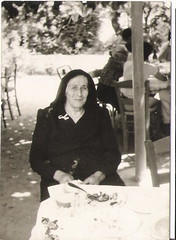
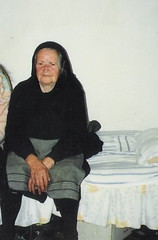
Yiayia Maria (early 70s) and Yiayia Calliope (early 90s); they both had five children each and both died nonagenarians. Maria was widowed during the Battle of Crete, while Calliope had the misfortune to outlive one of her children (my mother).
I was lucky to have met both my grandmothers; Maria was still alive when I visited Greece for the first time in the mid-70s, while Calliope was still around in the mid-90s when I settled in Crete permanently. I can still remember her slow speech rhythm and stringy voice, as if it was in need of some fine tuning. If she were here today with me and she saw me eating my apple pie, she would have squinted her tiny eyes; time was robbing her of her sight on an almost daily basis. Her colourless pupils would hover above my hand while she peered into it to have a closer look at my food. The first thing she would probably say is:
"Ιδέ� 'να πράμα! Ιντά 'ναι? Φέρτο μου οθ' επαγιέ. Εσύ τό'σιαξες*;"
Ithe 'na prama! Idane? Ferto mou oth'epayie. Esi to 'siaxes?
Look at that! What is it? Bring it to me here. Did you make it?
"Σα παξιμάδι μοιάζει. Νόμου το να το ιδώ."
Sa paximathi moiazei. Nomou 'to na to itho.
Looks like a rusk. Give it to me to look at.
She takes it and tightens her grip round it. The pastry disintegrates slightly; buttery crumbs fall onto the paper lining case that it came in.
"Ό'ι, δε' νε παξιμάδι. Ιντά 'χει μέσα;"
Oi, de 'ne paximathi. Idahi mesa?
No, it's not a rusk. What's inside it?
I break a piece off and put it in her hand.
"Ιντα ν'αυτό που έχει μέσα του; Σα ντι μαρμελάδα είναι. Μπας και νά ΄ναι μπαγιάτικο? Κακοδόπαθα και ν'αρρωστήξω!"
Idan' afto pou eshi mesa tou? Sa di marmelatha ine. Bas che nane bajatiko**? Kakodopatha kai n'arrostixo!
What's that inside it? Looks like marmelade. You don't think it's gone off, has it? Lordy, lordy, I'm gonna be sick!
Stale? Well, it certainly wasn't fresh. But I doubt she would've got sick on it. The 'best before' date showed that it was edible at the time of consumption, but there was no production date. I've just broken Pollan's Rule Number 3; who knows how long it had been sitting on the shelves of the kiosk? Worse still, the 'best before' date is not the expiry date. It could probably sit there for a year and never rot; there goes Rule Number 4.
I explain to yiayia that this is an apple pie (μηλόπιτα - milopita) and show her the package it came in. Fruit pies are not in her culinary repertoire; in Crete, fruit is eaten after a meal, in its original form, straight from the tree. She would have been familiar with apples and pears; local varieties of apples and pears were grown in Kambi (such fruits do well in colder areas). But she wouldn't know that their existence is now threatened by the continuous activity of land clearance, orchard planting and mass migration away from rural to urban areas; she herself had left her mountainous village many decades ago, and only visited it while her sister was still alive, perhaps once a year; her reappearance in the area was merely as a tourist. She never did return to live there, not even for her funeral.
"Και πού 'ντο;"
Che poudo?
Where is it?
I don't understand. "Where is what?" I ask her.
"Πού 'ντο το μήλο; Μηλόπιτα δε μού 'πες πως είναι;"
Poudo to milo? Milopita de moupes pos einai?
Where's the apple? Didn't you say this was an apple pie?
Now she has me; just where was that apple after all? What kind of apple pie was this if it didn't have any apple in it? And what exactly did it contain?
"Και πως τι φτιάξαν' αυτή τη πίτα; Ίντα τσι βάλαν μέσα;" she croaks.
Che pos ti ftiaxan' afti ti pita? Ida tsi valan mesa?
How did they make this pie? What did they put in it
Good point; I begin to read out the list of ingredients on the back of the packet, and am astounded myself as I discover what exactly it contains. To my dismay, I find that I have also broken Pollan's Rule Number 2 (more than 5 ingredients, or unpronounceable ingredients):
- wheat flour
- margarine (partly hydrogenated fats, salt, mono and diglycerides of fatty acids, acidifier, citric acid, preservative: potassium sorbate)
- sugar
- water
- butter
- baking powder
- invert syrup
- milk serum
- salt
- butter flavour
- vanillin
- preservative (potassium sorbate max. 0.2%)
- egg coating for decoration
- apple jam (apple 40%, sugar, glucose, gelling agent, pectin, acidifier, citric acid, starch, preservative: potassium sorbate max. 0.5%)
"Τόσανά 'χει; Πορό λοριό που δε κατέο. Ιντά'ν'ετούτενά τα πράματα;"
Tosana 'shi? Poro lorio pou de gateo. Idane etoutena ta pramata?
It's got so much in it? So much stuff I don't know. What on earth are those things?
Even I had to admit that most of the items listed were not to be found in a standard kitchen, not in Hania where I live now, not even where I grew up. Food and dining in New Zealand was an anything-goes venture, a fusion of international cuisines in which eaters partook of any kind of food as long as it 'tasted nice', without any cultural base on the part of the eater or the cooking technique. And who has ever heard of stocking milk serum, butter flavour and potassium sorbate in their larder, let alone have any idea what these things look like before they are added to a pie mixture?
"Αλεύρι σταρένιο; Γιάντα το πες έτσι δα; Ντα υπάρχει άλλο αλεύρι;"
Alevri starenio? Giada to pes etsi tha? Da iparhei allo alevri?
Wheat flour? Why did you call it that? Is there any other kind of flour?
"Well, yiayia," I explain, "some people may be allergic to wheat products..." but I didn't get a chance to finish my sentence.
"Δε μπορού' να φάν' ούτε ψωμί; Ετόσονα αλλεργικοί 'ναι; 'Επαγιέ στο ντόπο μας, ούλοι τρώνε το ψωμί! Πως αλλιώς 'α ζήσουν;"
De borou' na fan' oute psomi? Etosona allerjiki ne? Epaje sto dopo mas, ouli trone to psomi! Pos allios a zisoun?
They can't even eat bread? Are they that allergic? In this place, everyone eats bread. How else will they survive?
I break a bit off and give it to her.
"Here, yiayia, try some." I try to coax her. "It's sweet. You'll like it."
She takes the piece of apple pie from my fingers. Half of it has already crumbled onto the floor. As she raises her hand to her mouth, more crumbs fall down. She puts the pie into her mouth and slowly starts to chew it, turning the food with her tongue from one side of her jaw to the other. I watch as she swallows and see a lumpy mixture descending down her throat.
"Kalo einai, yiayia?" I ask tentatively. Did she like it?
"Kαρό; ούτε για τα οζα δε κάνει!"
Karo? Oute yia ta oza de kanei!
Good? It's not even good enough for the animals!
She raises her hand dismissively and turns her head to one side.
"Ιδέ! Το μισό μού 'πεσε στο μπέτι."
Ithe! To miso moy pese sto beti.
Look! Half of it fell on my chest.
She wipes the crumbs away from the front of her black dress and then wipes her mouth clear of the crumbs she can feel on her face, taking care not to dirty the black tzemberi*** tied round her head.
"Μπα, πράμα δε κάνει. Σα' τ'αχυρά 'ναι. Δε βρήκες άλλο πράμα να φας και 'σύ; Μόνο ξελιξίδια τρως!"
(Ba, prama de ganei. Sa t'ahira 'ne. De vrikes prama allo na fas che si? Mono xelixithia tros!
Nah, it's useless. Like eating strtaw. Couldn't you find anything else to eat? You only want to eat good bites!
Admittedly, it wasn't the best apple pie I'd eaten either. I felt embarrassed eating something I didn't need to be chewing on at the time, which I was eating in between meals (thereby breaking Pollan's Rule Number 5) in front of a computer screen (in effect breaking Rule Number 6).
"Δε'ν'αυτό φαγητό, παιδί μου," she adds. "Βάλε το στο κουβά για τσ' όρνιθες, μπας και το φαν' αυτές.
De 'nafto fajito, pedi mou. Vale to sti goyrna gia ts'ornithes, bas ke to fan aftes.
That's not what we call food, my child. Put it in the bucket for the chickens (ie where the leftover vegetable scraps are placed, to be given to the chickens), they might eat it.
Of course it wasn't real food; it came from a periptero, which is akin to Pollan's petrol station idea. I had just broken Rule Number 7; a periptero doesn't sell petrol, but it does sell the kinds of things Greeks use their cars to get to (even if they are two minutes away from their house), usually to purchase newspapers and cigarettes, 2-euro children's surprise bags containing plastic rubbish, chewing gum, caramels, potato crisps and all sorts of other junk, which is usually piggishly eaten while steering at the wheel.
"Κακιώρα να τού 'ρθει του βυζάστακα που σ'το πούλησε, και σού 'φαε τσι παράδες σου! Γάιρέ το απ' όκιδά πο'υ 'ρθε! Δε σού'π'η συγχωρεμένη η μάνα σου, προσοχή στου κουζουλούς, και 'σύ κατές γράμματα!
Kachiora na tou'rthei tou vizastaka pou sto poulise, che sou 'fae tsi parades sou! Gaire to ap' ochida pourthe! De soy'p'i mana sou i sihoremeni prososhi stou kouzoulous, esi pou kates grammata!
May bad tidings come to the greaseball who sold it to you and robbed you of your money! Return it to where it came from (ie chuck it out)! Didn't your late mother teach to beware of crazy people, and you know letters (ie you're educated and should know better)!
"Sure you don't want any more, yiayia?" I ask sheepishly.
"Ό'ι, παιδί μου, μη μου κάτσει στο κόλο και στουμπώσω. Φέρε μου μια λαραγγιά νερό μη πνιγώ απ'τα θράψαλα. Α' θες να φας καλί πίτα, να τσι βάλεις μαλάκα και πράμ' άλλο."
Oi pedi mou, mi mou katsi sto golo kai stoumboso. Fere mou mia laraggia nero mι pnigo ap'ta thrapsala. A' thes na fas kali pita, na tsi valeis malaka che pram' allo.
No, my child, it might sit on my bum and block up my system. Bring me a drop of water so that I don't choke on the crumbs. If you want to eat a good pie, put some malaka in it, and nothing else.
Wise words from Calliope, don't you think?
�All the bold words in Greek are part of the dialect of Cretan Greek.
*All my grandparents spoke only Cretan Greek - accent, dialect and all it entails. The Cretan accent is still heard on a daily basis right throughout the island, with regional differences from one prefecture to the other (just as there is in the food of each area of Crete), but the dialect (meaning the region-specific vocabulary) isn't often used, mainly due to the homogeneous education system in Greece. Most of the locals still break out into Cretan Greek when the need arises.
** In Cretan Greek, when a sound is transliterated as the English letter 'j', it should be pronounced the same way the French pronounce this letter, in words, for example like 'jeune'.
***τζεμπέρι - γυναικείο κάλυμμα της κεφαλής (woman's garment worn around the head); it's usually a sign of being widowed.
All dialectal words verified in a Cretan Greek lexicon.
©All Rights Reserved/Organically cooked. No part of this blog may be reproduced and/or copied by any means without prior consent from Maria Verivaki.
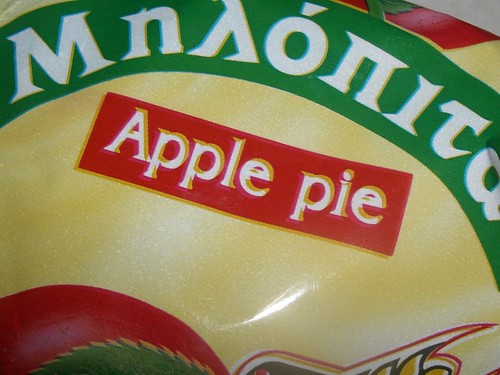
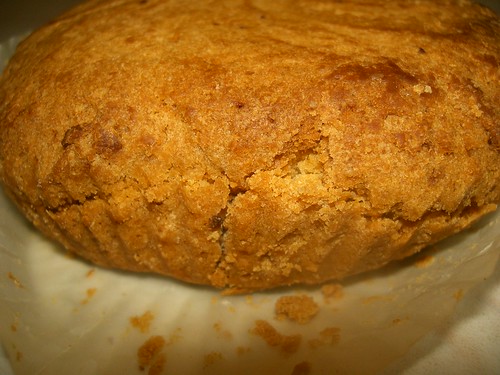
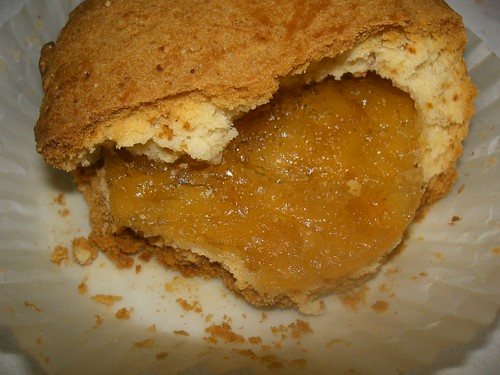
Hahaha! I just led a discussion last weekend at a women's group retreat on this very same book by Pollan, and we discussed some of the very same issues raised as in your imagined dialogue with your Yia-yia! She absolutely put into crystal clarity some of his more complex advice. We too have LOTS of such pseudo snack pastries for sale in this country & when you really look at them in the light of day, they're not even remotely like real food! You out-did yourself this time, Maria! Kudos!
ReplyDeleteI think my grandmother would have reacted the same way. I try to follow similar principles but have occasionally broken them...we are human aren't we?
ReplyDeleteLove, love, love this post. So funny and so true. Great writing!
ReplyDeleteWise words, indeed! Awesome post, Maria.
ReplyDeleteWhenever I am to buy a (new) packaged product, I first check the list of ingredients; this has become a habit of mine.(Some people consider this an obsession.)I tend to buy less and less of such products - it's quite complicated to find one with less than 5 ingredients, even if we're talking organic certified products here.
Funny (or better shocking) thing is, my grandma who is in her mid-70's, buys more packaged food than I do. Honestly, I find this hard to swallow.
Maria, don't feel guilty. I think every once in a while we're allowed; as long as we don't make it a habbit. I also try to stay away from foods that have way too many ingredients and ingredients that I do not recognize, but once in a blue moon, I crave junk food, especially at the office. Although I try to keep myself from going to the vending machine, sometimes I got to treat myself.
ReplyDeleteWhat a funny story! I actually had to read the english translations to the "greek" dialogue! The only thing I can eat from a peripteron are Cream Crackers. Plain and simple.
ReplyDeleteI loved this story and I also appreciate your translation. My Greek is pracitcally non-existent (only a few phrases learnt during my holidays in Sfakia) but you help me get a feeling for the language.
ReplyDeleteA very cute story, Maria. I sometimes give in and buy a processed snack too, I think most of us do. But, I'm like you, I usually regret it it afterwards, because they aren't that good. Now, chocolate candy is another thing! I love it, but don't indulge too often!
ReplyDeleteMaria, I read the whole piece and I enjoyed the whole conversation with yiayia.
ReplyDeleteYou were hungry, you broke and ate something industrial. So what? I'm sure Pallin's popped into a McDonald's in the past year.
Hi Maria ... Just wanted to say Happy Mother's Day (do they celebrate that in Greece?)! I'm fighting a nasty sinus infection, so I'll be back another time to read your post. Just wanted to say Happy Mother's Day!
ReplyDeleteI so love your narratives! I still buy and eat packaged foods and yes, I do enjoy them - at least as I'm eating. The self-recriminations come later. However, I'm not much for rules or even suggestions; I've become neurotic about food and eating because of anxieties about calories, processed ingredients, the global environmental impact of my food choices . . . I think Pollan's seven words are sufficient and we should work it out for ourselves how we go from there.
ReplyDeleteFunniest post! I really enjoyed reading. Who does not have a Yaya should buy one! A wise one like yours - is priceless!
ReplyDeleteI had a similar experience last week, only I bought the strawberry pie in our local "natural foods" store. Inside no berries were in view, just a thin spread of some processed jam. The crust wasn't bad, probably no preservatives at least, and fresh. I think Pallin's ideas are a good easy to remember guide. But, hey, rules are sometimes broken, and then remind us of why we have them.
ReplyDeleteBrilliant post - I can just imagine your yia yia berating you about the pie. It's a beautifully personal way to look at Pollan's rules. We all make these mistakes with food from time to time, but trying most of the time is the thing that counts (or so I tell myself).
ReplyDeleteloved the post! I try and read labels, but it is so hard now that I moved and dont know russian! so I try to make everything myself - at least I know what is in it!! As I read your blog I thought about our last trip to Ios where, every morning around 4 am (the kids had such a hard time adusting to the time change), my dad would take my then 5 year old son to the local bakery - right when it opened - and get him a milopita - fresh and hot from the oven! mmmmm nothing compares! Once in a while you must break the rules - if for no other reason than to remind yourself why you follow them in the first place!
ReplyDeletewhat a wonderful post! I'm a great Crete addict and would herby like you to take a look at http://kreta.nl, a Dutch webite on Crete.
ReplyDeleteI've planned to make the BBQ chicken tonight!
Maria--you are a genius. An astounding piece that people from anywhere could relate to. This is one I suggest you send to a magazine. By the way, your grandmothers were so beautiful! Thanks, also for the lovely Cretan patois. A beautiful post...
ReplyDeleteWell put Maria,even my grandma wouldn't understand or appreciate a thing about processed foods.
ReplyDelete